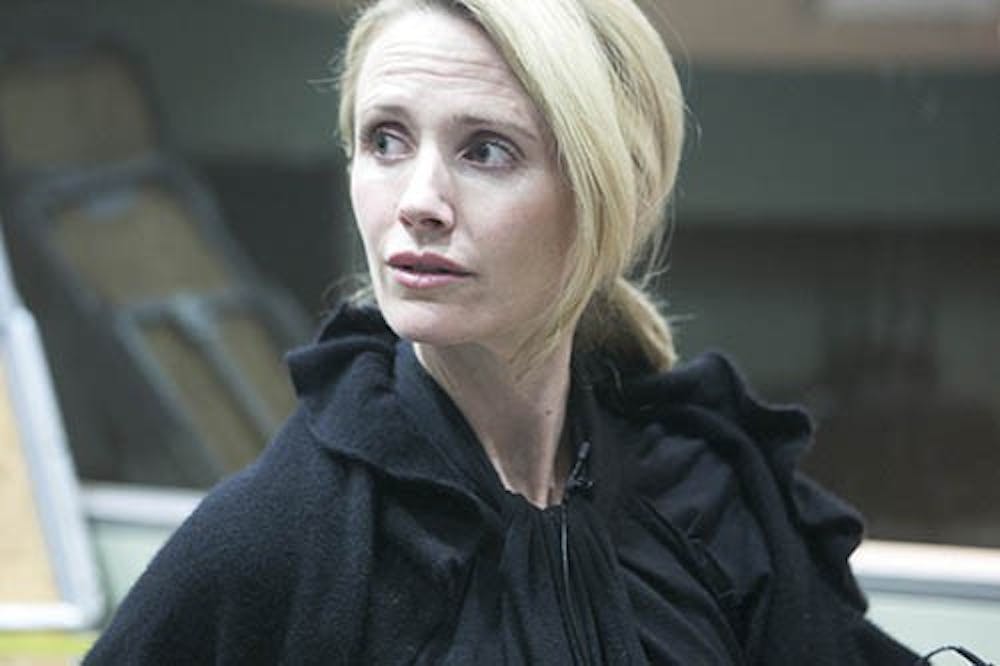The gender gap of women and men in power positions and the way women are portrayed in media were directly confronted in conversation on Wednesday night.
Students packed Pruis Hall for two hours to hear Jennifer Siebel Newsom’s talk, “Miss Representation: Power and Influence in the Media,” the 18th installment in the David Letterman Distinguished Professional Lecture and Workshop Series.
Newsom is fueled by the stereotypical representation of women in mainstream media. She wrote, directed and produced the award-winning documentary “Miss Representation,” which explored how the gap in power positions between men and women.
“I’m talking about an industry that not only informs American cultural values but then exports those values to the rest of the world,” Newsom said. “If you can make a sex tape and party with the best of them, then you can be catapulted into celebrity-dom overnight. And that’s success in our country, at least what mainstream media tells us.”
Newsom said that everyone is guilty of complacent on the issue of gender stereotypes, which are fueled by the media and affect whether or not girls and women pursue power.
Newsom said it is hypocritical in today’s world to tell girls they can be whatever they want to be.
“The cultural trend is girls being taught to manipulate their bodies and boys being taught to master the world around them,” Newsom said. “The marketplace further reinforces a culture that devalues our women and girls, while expanding the opportunities available to our boys and men.
She shared her experiences going into Hollywood to act as an educated woman, and seeing how nothing she had done in the real world, like graduating from Stanford or serving overseas, mattered there. It inspired her to contribute to the conversation and create her documentary.
This generation, she believes, is less receptive to stereotypes and can really make headway on these issues.
“All around the globe, people are joining the movement and using their voices to enact change,” Newsom said. “We’re in the driver’s seat here. Let’s demand a culture that lifts us up, that inspires my daughters and all of you out there to be President of the United States, or something else. Together, we will change culture and we will succeed.”
After speaking for an hour, Newsom took questions from students for an additional hour on how related topics like race, class and religion affect the issues. Pruis remained packed full of students throughout the entire presentation.
As a male in the audience, telecommunications major Caleb New said the issues Newsom dealt with are things of which he personally has to consider the implications.
“[Her talk was] a big reminder and encouragement to me on how to treat my fiancée and how I will treat her as a wife and also how we are going to raise our kids,” New said. “Definitely being able to raise our kids in a way that our daughters will know how valued and how excellent they are, just as my sons will be.”
Riley Gray special education major has a minor in women and gender studies and is a member of feminists for action. During the question and answer part of the event, she expressed how Newsom’s documentary had changed her views on the world, calling herself her “biggest fan.”
“It made me realize that it’s OK to be who I am,” she said. “All of these things you hear from the media and from our culture are not believable, they are not achievable. It’s OK that you don’t meet those in fact; it’s perfect that you don’t meet those.”
Wednesday night’s event gave Gray hope for what she calls the “gender revolution.”
“I thought I was going to cry [at how many students attended,]” Gray said. “The fact that it was packed and the fact that most people stayed for two hours floored me. What this woman believes and what this movement [stand for] is true and it’s powerful and it’s going to change the world.”


